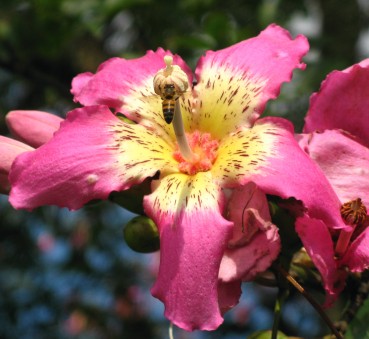He says to his friend:
Love, love, people say;
love’s neither a misery nor a malady;
it doesn’t gradually increase or subside;
like musth appearing on a foliage chewing elephant,
it surfaces suddenly at the sight of my beloved.
His friend says to him:
My lord with broad shoulders!
Love, love, people say;
love’s neither a misery nor a malady;
like the delight of an old cow
licking fresh grass in ancient hilly meadows,
love’s nothing but a feast of one’s fancy.
தலைமகன் பாங்கற்கு உரைத்தது
காமங் காம மென்ப காமம்
அணங்கும் பிணியு மன்றே நுணங்கிக்
கடுத்தலுந் தணிதலு மின்றே யானை
குளகுமென் றாண்மதம் போலப்
பாணியு முடைத்தது காணுநர்ப் பெறினே.
தலைமகற்குப் பாங்கன் உரைத்தது
காமங் காம மென்ப காமம்
அணங்கும் பிணியு மன்றே நினைப்பின்
முதைச்சுவற் கலித்த முற்றா விளம்புல்
மூதா தைவந் தாங்கு
விருந்தே காமம் பெருந்தோ ளோயே.
Kurunthokai is an anthology (தொகை) of short(குறு) love poems, dated between 2nd century BCE and 2nd century CE. These poems are rich in metaphors. These are written by various poets. Above poems are poem no. 136 and 204 written by the same poet Milai Perung-Kandhan. Though they appear apart in the anthology they are like a dialogue between the hero and his friend. The first two lines of the poems are same.
Poem 136 – His friend chides him for losing his reserve over his love for a woman. He responds with “People talk a lot about love. It is not a pain I suffer due to others nor a new disease that has afflicted me. It doesn’t gradually increase or decrease. There is no way for me to control it. It strikes suddenly. An elephant chewing foliage is suddenly driven to musth when it eats a particular type of herb. Similarly, when I see her, I lose my self control and my love for her surfaces.”
Poem 204 – His friend responds to him “People talk a lot about love (You say I am mocking your love). It is neither a pain nor a disease. It is something that surfaces only when we think of it. Like an old cow licking fresh grass. Since it is old, it cannot chew the grass, but remembers the taste from when it was young. So what delights the cow is not the grass itself, but the thought of it. Similarly, this love you talk about is in your thoughts only. If you don’t think of it, it won’t affect you.” ‘Broad shouldered lord’ and ‘old cow’ imply “You were strong before you saw her. Now you are like an old cow, living in your fancy world with her.”

